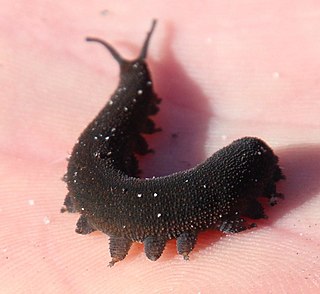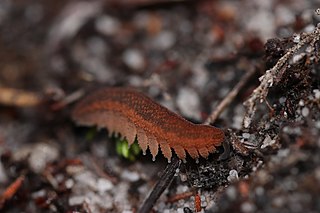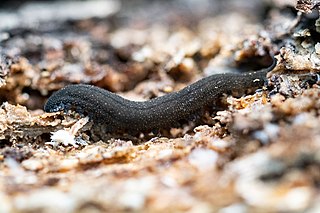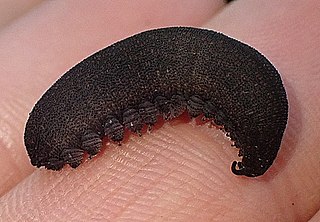
Peripatopsis is a genus of South African velvet worms in the Peripatopsidae family. The number of legs in this genus ranges from as few as 16 pairs to as many as 25 pairs and varies within species when the number is greater than 18 pairs. Velvet worms in this genus feature a last pair of legs that is rudimentary or reduced in size, mainly in males. This genus exhibits matrotrophic viviparity, that is, mothers in this genus retain eggs in their uteri and supply nourishment to their embryos, but without any placenta.

Peripatopsidae is one of the two living velvet worm families.
Opisthopatus cinctipes is a species of velvet worm in the Peripatopsidae family. This species has 16 pairs of legs, all with claws and all used for walking. The color of the dorsal surface varies from blue to olive green. Females range from 7 mm to 50 mm in length, whereas males range from 6 mm to 36 mm. Like other velvet worms in this genus, this species exhibits matrotrophic viviparity, that is, mothers in this genus retain eggs in their uteri and supply nourishment to their embryos, but without any placenta. The type locality is in South Africa.
Peripatopsis balfouri is a species of velvet worm in the Peripatopsidae family. This species has 18 pairs of clawed legs. Also known as the blue velvet worm, this species ranges from 9 mm to 22 mm in length. The type locality is in South Africa.
Peripatopsis birgeri is a species of velvet worm in the family Peripatopsidae. This species is a clade in the P. moseleyi species complex. The number of legs in this species varies from 21 pregenital pairs to 22 pregenital pairs. Live animals are light green, brown, or black with a distinct pale head collar; the ventral surface is creamy white. Males range from 23 mm to 40 mm in length; females range from 28 mm to 40 mm in length. Also known as the Mount Currie velvet worm, this species is known only from the Mount Currie Nature Reserve in South Africa.
Peripatopsis bolandi is a species of velvet worm in the family Peripatopsidae. This species is a clade in the P. balfouri species complex and ranges from 18 mm to 22 mm in length. Also known as the Boland velvet worm, this species is found in the Hottentots Holland Mountain region in South Africa.

Peripatopsis capensis is a species of velvet worm in the Peripatopsidae family. This species has 18 pairs of legs: 17 pregenital leg pairs with claws plus one strongly reduced last pair without claws or spinous pads. Females of this species range from 9 mm to 70 mm in length, whereas males range from 6 mm to 54 mm. The native range of this species is limited to the Cape Peninsula of South Africa.
Peripatopsis cederbergiensis is a species of velvet worm in the family Peripatopsidae. This species is a clade in the P. balfouri species complex. Males of this species have 17 clawed legs with the last pair highly reduced, whereas females have a complete foot with claws on the reduced leg. This species is charcoal black in color and ranges from 9 mm to 15 mm in length. Also known as the Cederberg velvet worm, this species is endemic to the Cederberg Mountains of South Africa.
Peripatopsis intermedia is a species of velvet worm in the Peripatopsidae family. This species is about 33 mm long and has 19 pairs of legs: 18 pregenital leg pairs plus a last pair of much reduced legs. The type locality is in South Africa. Although some authorities doubt the validity of this species and deem it to be a junior synonym of P. balfouri, others consider these two to be separate species, citing the distance between their type localities.
Peripatopsis janni is a species of velvet worm in the family Peripatopsidae. This species is a clade in the P. moseleyi species complex. The original description of this species is based on male specimens ranging from 15 mm to 30 mm in length. Live animals are dark green on the dorsal surface but greyish white on the ventral surface. The number of legs in males of this species varies from 21 pregenital pairs to 22 pregenital pairs. Also known as the Amathole velvet worm, this species is found in the Amathole mountains in South Africa.

Peripatopsis lawrencei is a species of velvet worm in the Peripatopsidae family. This species has 18 pairs of legs: 17 pregenital leg pairs plus one last pair that is strongly reduced and without claws or spinous pads. This species is restricted to the Theewaterskloof-Overstrand region of South Africa.

Peripatopsis moseleyi is a species of velvet worm in the Peripatopsidae family. Males of this species have 20 to 24 pairs of legs with claws ; females have 19 to 23 pairs of legs with claws. Females range from 11 mm to 75 mm in length, whereas males range from 9 mm to 50 mm. The type locality is in South Africa.
Peripatopsis sedgwicki is a species of velvet worm in the Peripatopsidae family. Also known as the Tsitsikamma velvet worm, this species varies from blue-tan green to bright orange and brown violet. The number of legs in this species ranges from 19 pairs to 23 pairs, with a claw present on the genital pair and the last pair reduced more in the male than in the female. Females of this species range in size from 12 mm to 68 mm in length, whereas males range from 10 mm to 46 mm in length. Like other velvet worms in this genus, this species exhibits matrotrophic viviparity, that is, mothers in this genus retain eggs in their uteri and supply nourishment to their embryos, but without any placenta. The type locality is in South Africa. This species has a limited geographic distribution but is especially abundant in the indigenous forest of the Tsitsikamma mountains.

Peripatopsis overbergiensis, the Overberg velvet worm, is a species of velvet worm in the Peripatopsidae family. This species usually has 19 pairs of legs: 18 pregenital leg pairs plus one last pair that is strongly reduced and without claws or spinous pads. Some individuals, however, have only 18 leg pairs. This species is limited to the Overberg region of South Africa.
Peripatopsis purpureus is a species of velvet worm in the family Peripatopsidae. This species is a clade in the P. balfouri species complex. Males of this species have 17 clawed legs with the last pair highly reduced, whereas females have a complete foot with claws on the reduced leg. Specimens range from 17 mm to 25 mm in length. Named for its purple-blue color, this species is found in the Western Cape Province of South Africa.
Peripatopsis storchi is a species of velvet worm in the family Peripatopsidae. This species is a clade in the P. moseleyi species complex. The number of legs in this species ranges from 21 pregenital pairs to 23 pregenital pairs. Males of this species range from 12 mm to 22 mm in length, and females range from 22 mm to 36 mm in length, but live animals can stretch to 50 mm while walking. Also known as the Katberg velvet worm, this species is known only from the Katberg forest in South Africa.

Peripatopsis alba, the white cave velvet worm, is a species of velvet worm in the family Peripatopsidae. This species has 18 pairs of clawed legs, with the last pair reduced, and no eyes. Specimens range from 32 mm to 48 mm in length. Like other velvet worms in this genus, this species exhibits matrotrophic viviparity, that is, mothers in this genus retain eggs in their uteri and supply nourishment to their embryos, but without any placenta.

Peripatopsis clavigera, the Knysna velvet worm, is a species of velvet worm in the Peripatopsidae family. This species has 16 pairs of legs and ranges from 4 mm to 17 mm in length. Peripatopsis clavigera is found in subtropical or tropical moist montane forests of the Diepwalle Nature Reserve in South Africa.
Peripatopsis leonina, the Lion's Hill velvet worm, is a species of velvet worm in the Peripatopsidae family. This species has 20 to 24 pairs of legs, usually 21 or 22 leg pairs, with the last pair of legs reduced. Females of this species range from 7 mm to 41 mm in length, whereas males range from 7 mm to 34 mm.
Peripatopsis tulbaghensis is a species of velvet worm in the family Peripatopsidae. This species is dark brown with 17 pairs of legs and ranges from 8 mm to 32 mm in length. Also known as the Tulbagh velvet worm, this species is found in Groot Winterhoek mountain region in South Africa.







